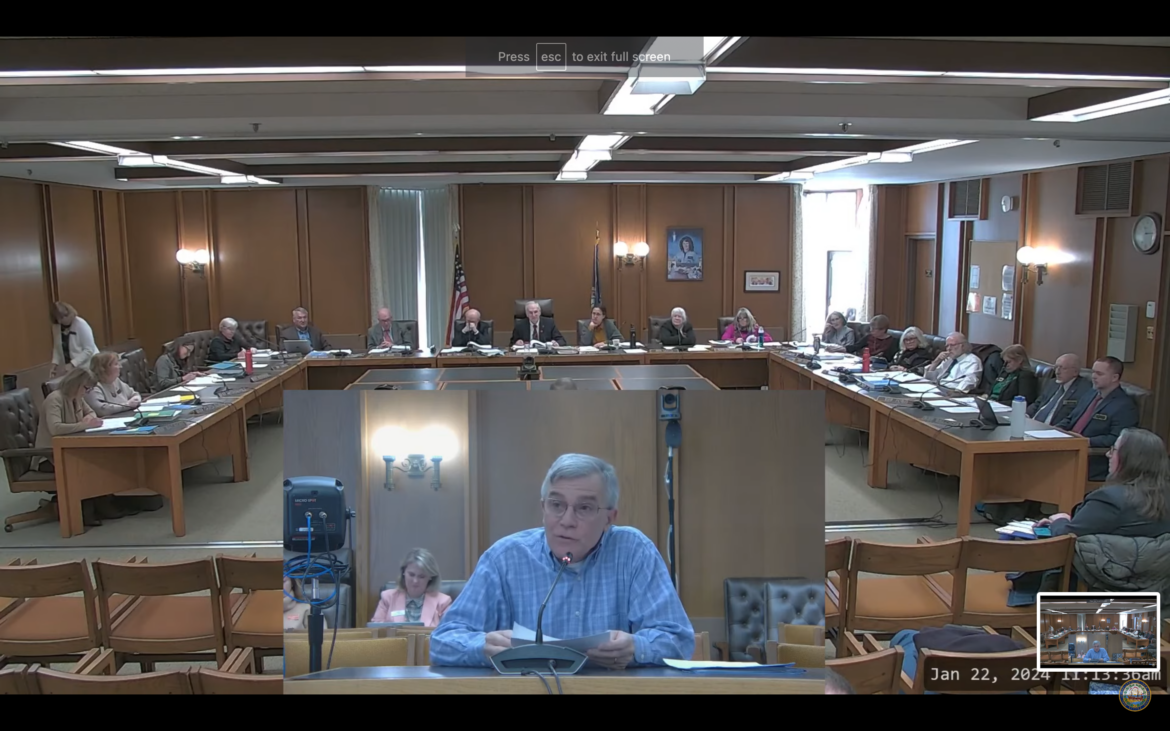By GARRY RAYNO, InDepthNH.org
CONCORD — A bill seeking to have schools emphasize four of the 11 elements of a state-defined adequate education is not needed, a House committee was told Monday.
If the Legislature wants to improve education assessment scores, it should fully fund the costs of an adequate education allowing school districts to hire reading specialists, reduce elementary class sizes and use more hands-on learning, one person told the House Education Committee at a public hearing on House Bill 1691.
The bill, sponsored by Rep. Glenn Cordelli, R-Tuftonboro, is similar to one introduced two years ago by Education Commissioner Frank Edelblut, but the committee’s vice chair said his bill does not change the makeup of an adequate education, but directs school districts to emphasize English language skills, math, science and social studies.
“I don’t know how many times I heard from my constituents ‘Why don’t we just concentrate on the basics in our public schools?’” Cordelli said, noting the proficiency scores from schools in his area are below 50 percent in most instances.
He said he has read numerous articles in which business leaders say they cannot find qualified employees to hire because they lack basic skills.
The bill does not prescribe what school districts have to do to improve the scores for assessment testing, he said, noting it would be up to the local districts how they address the requirement.
“By stating the emphasis has to be placed on the basics, we send a message to New Hampshire schools and New Hampshire parents, we recognize the problems we face,” Cordelli said, “and we are trying to take action by telling the schools they need to pay attention to these subject areas. If not, what does our future hold?”
He was questioned about what the scores would mean in terms of typical grading in schools, but did not know how they would translate into letter grades, noting they are different systems.
Other committee members noted state schools do emphasize the four basic areas in their curriculum.
Rep. Patricia Cornell, D-Manchester, said she spoke with the city’s school superintendent and the curriculum emphasizes English, math, science and social studies.
Cordelli said he did not do a survey of school districts to see if they emphasized the four basic areas, but again said the assessment test scores are an indication something needs to be done.
Debrah Howes, president of the American Federation of Teachers, said the bill gives short-shrift to the other seven content areas of the 11 that comprise an adequate education.
“This bill makes one group extremely important, and the other group less important,” Howes said, “and we know those get budgeted, . . . if we have the time or if we have money for it.”
She said the state Supreme Court’s Claremont education decision calls for a robust education not just bare bones.
“Students deserve an arts education, as well as to learn how to calculate, how to read, how to read Shakespeare not just a technical manual,” Howes said. “They deserve a fully robust education. They have that right.”
It should not be top down, shoe-horn in, or a one-size-fits-all approach, she said.
David Trumble of Weare told the committee assessment scores could be improved by fully funding adequacy without having to deemphasize any of the 11 areas of an adequate education.
He noted the recent Conval school funding decision said the state should be paying $550 million more to school districts to cover the cost of an adequate education which the Claremont decision requires.
Schools could use that money to hire reading specialists, to reduce classroom populations, and more robust learning areas, he said.
He noted the 11 areas were approved overwhelmingly by a bipartisan vote of the legislature. They are also important to the New Hampshire constitution that the state is responsible for not just a basic education, but a program grounded in the arts, cultural and historical heritage, world languages and physical education, he said.
“If the goal is to educate the person, the development of the person,” Trumble said, “you need to educate the whole person,” noting that cutting music from the curriculum would also impact math and English scores.
The electronic system to collect testimony and positions on the bill, indicated that 361 people oppose the bill and 9 support it.
The committee did not make an immediate recommendation on the bill.
Garry Rayno may be reached at garry.rayno@yahoo.com. Garry Rayno has four decades of experience as a New Hampshire reporter.






